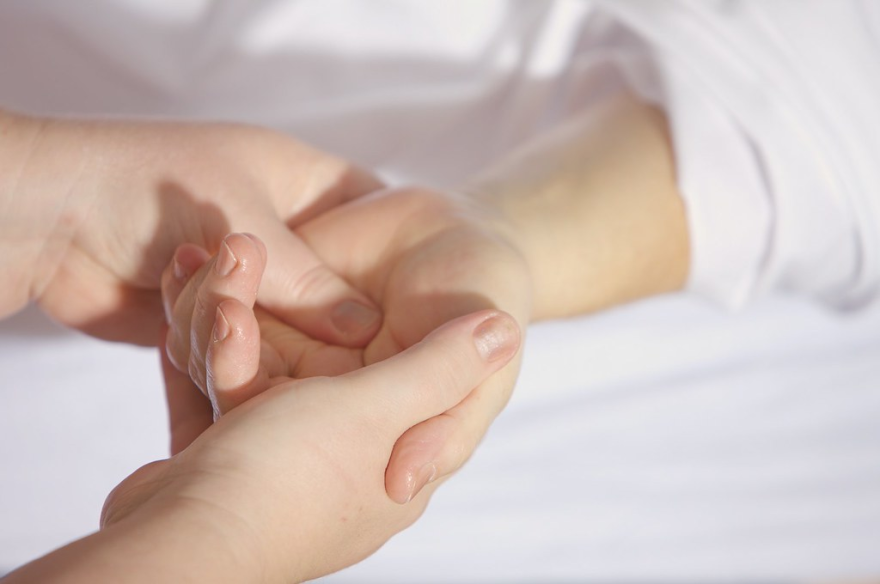Has anyone checked on the huggers? As weeks of social distancing wear on, many are missing the comforts of a warm embrace — especially those who live alone. Touch has always been an essential emotional and physiological need. In its absence, more people are seeking out creative solutions. From self-massage and weighted blankets to pet fostering and adoption, those sheltering in place are finding new ways to connect with their bodies and their inner selves.

On this episode of Embodied, a series about sex, relationships and your heath, host Anita Rao talks to , a licensed clinical social worker and somatic experiencing practitioner in Chapel Hill, and , research professor and director of the Touch Research Institute at the University of Miami Miller School of Medicine.
These experts explain what is happening to our bodies, brains and touch needs during this pandemic, and they cover topics like the health benefits of skin movement and nerve stimulation and practical tips for inducing good touch feelings at home.
Rao also looks at a new surge of interest in fostering and adopting pets during COVID-19 with Joanne Duda, foster coordinator at the .
Four Roles that Physical Touch Plays in Dealing with the Pandemic
Touch is...
A Regulator of Stress
When humans experience an outside threat, the body kicks into gear. Touch is a part of the first body system response to stress, known as the social engagement system.
“This is our system of communication and connection, and how we communicate safety in relationships and how we bond,” Scatoloni said. “ Obviously, you know, we don't have access to that right now.”
If the social engagement system is unavailable, the body turns to the next system of defense: the system that controls our “fight or flight” response, also known as the sympathetic nervous system.
“We're going to feel things like increased heart rate, muscle tension, we're going to scan the environment for danger,” Scatoloni said. “And emotionally we're going to start to feel things like anger, anxiousness, maybe have panic attacks, racing thoughts, difficulty sleeping, trouble focusing or even paranoia.”
The social engagement system is not completely out of commission though. Touch is only one piece. Humans can also feel a sense of connection through eye contact or facial expression.
“Those may not be things that we're used to really tuning into to feel someone's presence,” Scatoloni said.
An Immune System Booster
When someone places a hand on your shoulder or gives you a long hug, it stimulates pressure receptors under the skin. This stimulus travels to the brain, where nerves send a signal to decrease the amount of one of the most common stress hormones in our bodies, cortisol.
Cortisol suppresses the immune system, including the activities of a type of white blood cell called the natural killer cell. These natural killer cells ward off viral, bacterial and even cancer cells that could harm our health.
These immune system benefits make touch an important part of our physical well-being. In a time where shelter-at-home orders have some people living alone, Field has come up with some ways to keep finding stimulation.
“What we've found is that things like massage and yoga are quite equivalent in getting that kind of response,” Field said. “If you're just walking around the room, you're stimulating pressure receptors in your feet, which helps the whole system. Our hand washing is stimulating our hands a great deal. So there are lots of ways to compensate for the absence of touch in terms of people who are alone.” You can contribute to Field's research on other coronavirus coping activities by completing her survey .
A Sleep Aid
If you’ve been having trouble sleeping during the pandemic, you’re not alone. Many people are experiencing sleep deprivation during this time, Field said. One way troubled sleepers can help themselves get good sleep? Touch.
“They need to make sure that they're spending some time moving their skin,” Field said.
Ideally, a partner or friend can provide a massage or other skin stimulation. But if you’re alone, there are many other ways to feel touched and feel connected to your body.
“We support clients in utilizing self touch a lot,” Scatoloni said. “We might teach clients to put one hand on their head and one on their chest, or a hand on the heart and a hand on the stomach and just breathe into those places.”
Scatoloni also recommends a few props that can induce touch feelings.
“Other types of tools I might use are things like a weighted lap pad [or a] weighted blanket,” she said. “If people don't have money for a weighted blanket — because they can be expensive — I'll have clients go buy a five pound bag of rice.”
A Way to Connect with Our Pets!
Companionship comes in many forms — and during the coronavirus lockdown, some individuals and families are looking to add a new pet to their household, at least temporarily. Interest in pet fostering and adoption has been on the rise since the beginning of the COVID-19 crisis, as homebound people look for new ways to give and receive both touch and affection.
It’s a trend that Joanne Duda, foster coordinator for the Wake County Animal Center, finds understandable.
“This is an easy way to have contact with another living thing that can respond to you, without having to worry about the spread of COVID.”
But she cautioned that any pandemic-induced warm-and-fuzzies are temporary.
“Adopting an animal is a commitment for the life of that animal,” Duda said. “Is this something that you can maintain when your life comes back, when you’re actually able to go out and interact with people again, when you have more work obligations or social obligations that will take you out of the house? It’s definitely something that people need to take into consideration and not think in the short-term.”




